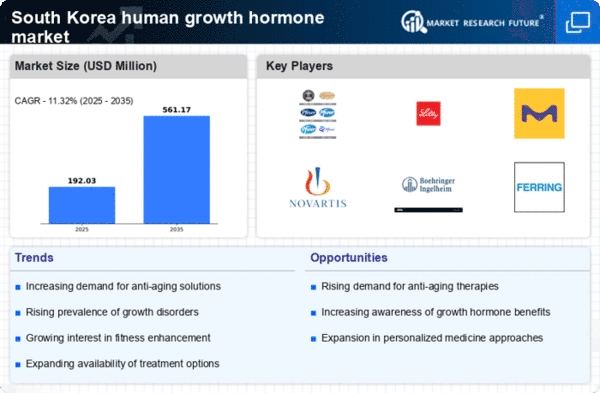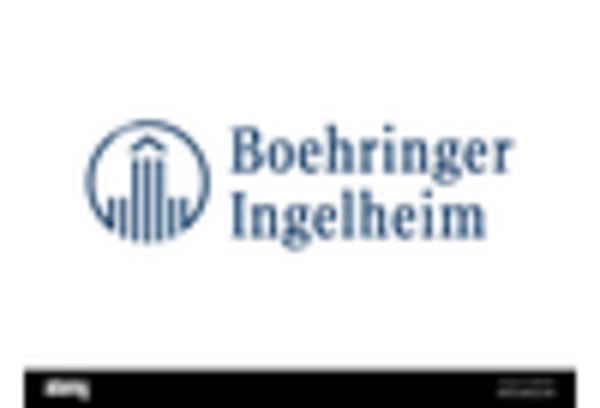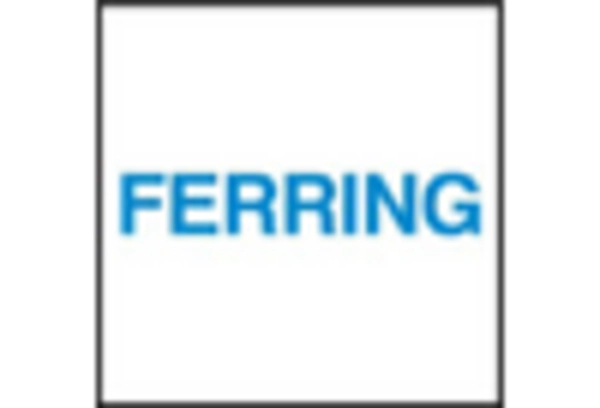Rising Prevalence of Growth Disorders
The human growth-hormone market is significantly influenced by the rising prevalence of growth disorders in South Korea. Conditions such as growth hormone deficiency and Turner syndrome are becoming more recognized, leading to an increased need for effective treatment options. According to recent health statistics, approximately 1 in 3,000 children are diagnosed with growth hormone deficiency, which necessitates the use of growth hormone therapies. This growing awareness among healthcare professionals and parents is likely to drive the market forward, as early diagnosis and intervention become more common. The human growth-hormone market is expected to expand as healthcare providers increasingly recommend these therapies to address growth-related issues, thereby enhancing the quality of life for affected individuals.
Advancements in Healthcare Infrastructure
The human growth-hormone market is benefiting from advancements in healthcare infrastructure across South Korea. The government has been investing in healthcare facilities and services, which has improved access to medical treatments, including hormone therapies. Enhanced healthcare infrastructure facilitates better diagnosis and treatment options for patients with growth disorders, thereby increasing the demand for human growth hormone therapies. Furthermore, the integration of advanced technologies in healthcare, such as telemedicine and electronic health records, is streamlining patient management and follow-up care. This improved accessibility and efficiency in healthcare services is likely to contribute positively to the growth of the human growth-hormone market, as more patients are able to receive timely and effective treatments.
Increasing Demand for Anti-Aging Solutions
The human growth-hormone market in South Korea is experiencing a notable surge in demand for anti-aging solutions. As the population ages, there is a growing interest in therapies that can mitigate the effects of aging. This trend is particularly pronounced among individuals aged 40 and above, who are increasingly seeking treatments to enhance vitality and overall well-being. The market is projected to grow at a CAGR of approximately 8% over the next five years, driven by this demographic shift. Furthermore, the societal emphasis on youthfulness and physical appearance is likely to propel the adoption of human growth hormone therapies, as consumers become more aware of their potential benefits. This increasing demand for anti-aging solutions is a significant driver for the human growth-hormone market, influencing both consumer behavior and market dynamics in South Korea.
Increased Investment in Research and Development
The human growth-hormone market is poised for growth due to increased investment in research and development (R&D) by pharmaceutical companies in South Korea. As the understanding of human growth hormone and its applications expands, companies are focusing on developing innovative therapies and delivery methods. This investment is likely to lead to the introduction of new products that cater to various patient needs, including those with specific growth disorders or age-related conditions. Furthermore, collaborations between academic institutions and industry players are fostering a conducive environment for innovation. The human growth-hormone market stands to benefit from these advancements, as new research findings may enhance treatment efficacy and safety, ultimately attracting more patients to seek hormone therapies.
Growing Interest in Sports Performance Enhancement
The human growth-hormone market is also being driven by a growing interest in sports performance enhancement among athletes and fitness enthusiasts in South Korea. As competitive sports gain popularity, there is an increasing focus on optimizing physical performance and recovery. Human growth hormone is often perceived as a potential solution for improving athletic performance, leading to its illicit use in some sports circles. This trend has prompted discussions around the regulation and monitoring of hormone therapies, as authorities seek to ensure fair play in sports. The human growth-hormone market may see fluctuations in demand as awareness of the risks and benefits of such therapies evolves within the athletic community, influencing both legal and illegal usage patterns.
















